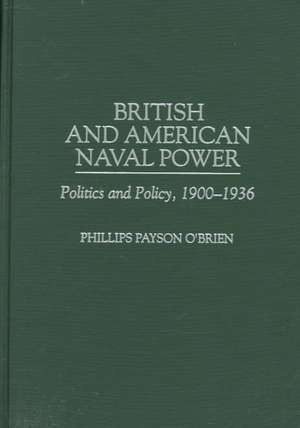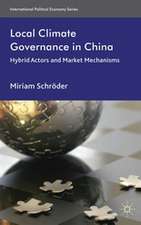British and American Naval Power: Politics and Policy, 1900-1936: Praeger Studies in Diplomacy and Strategic Thought
Autor Phillips O'Brienen Limba Engleză Hardback – 22 apr 1998 – vârsta până la 17 ani
Din seria Praeger Studies in Diplomacy and Strategic Thought
- 24%
 Preț: 461.60 lei
Preț: 461.60 lei - 28%
 Preț: 419.54 lei
Preț: 419.54 lei - 28%
 Preț: 498.33 lei
Preț: 498.33 lei - 28%
 Preț: 436.80 lei
Preț: 436.80 lei - 30%
 Preț: 668.98 lei
Preț: 668.98 lei - 18%
 Preț: 355.15 lei
Preț: 355.15 lei - 24%
 Preț: 461.95 lei
Preț: 461.95 lei - 27%
 Preț: 439.17 lei
Preț: 439.17 lei - 28%
 Preț: 437.40 lei
Preț: 437.40 lei - 24%
 Preț: 463.55 lei
Preț: 463.55 lei - 27%
 Preț: 378.02 lei
Preț: 378.02 lei - 27%
 Preț: 463.88 lei
Preț: 463.88 lei - 35%
 Preț: 461.35 lei
Preț: 461.35 lei - 24%
 Preț: 460.60 lei
Preț: 460.60 lei - 27%
 Preț: 511.72 lei
Preț: 511.72 lei - 28%
 Preț: 437.31 lei
Preț: 437.31 lei - 28%
 Preț: 375.91 lei
Preț: 375.91 lei
Preț: 593.81 lei
Preț vechi: 811.73 lei
-27% Nou
Puncte Express: 891
Preț estimativ în valută:
113.62€ • 118.64$ • 93.83£
113.62€ • 118.64$ • 93.83£
Carte tipărită la comandă
Livrare economică 15-29 aprilie
Preluare comenzi: 021 569.72.76
Specificații
ISBN-13: 9780275958985
ISBN-10: 0275958981
Pagini: 288
Dimensiuni: 156 x 235 x 21 mm
Greutate: 0.59 kg
Ediția:New.
Editura: Bloomsbury Publishing
Colecția Praeger
Seria Praeger Studies in Diplomacy and Strategic Thought
Locul publicării:New York, United States
ISBN-10: 0275958981
Pagini: 288
Dimensiuni: 156 x 235 x 21 mm
Greutate: 0.59 kg
Ediția:New.
Editura: Bloomsbury Publishing
Colecția Praeger
Seria Praeger Studies in Diplomacy and Strategic Thought
Locul publicării:New York, United States
Notă biografică
PHILLIPS PAYSON O'BRIEN is a lecturer in Modern History at the University of Glasgow in Scotland. From 1991 until 1996 he was both the Mellon Research Fellow in American History at Cambridge University and a Drapers Research Fellow at Pembroke College, Cambridge.
Cuprins
AbbreviationsIntroductionBefore the WarNaval Policy in Great Britain and the United StatesBritish Naval Power from the Two Power Standard to 1908Theodore Roosevelt and American Naval PowerThe 1909 Naval Estimates CrisisFrom Taft to WilsonThe Inter-War YearsAnglo-American Rivalry and the Paris Peace ConferenceThe Washington Conference and the Question of Naval ParityThe Geneva Conference: A Crisis in Anglo-American RelationsThe Highpoint and Collapse of the Naval Arms Control ProcessConclusionAppendix 1Appendix 2BibliographyIndex

















